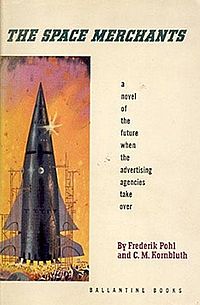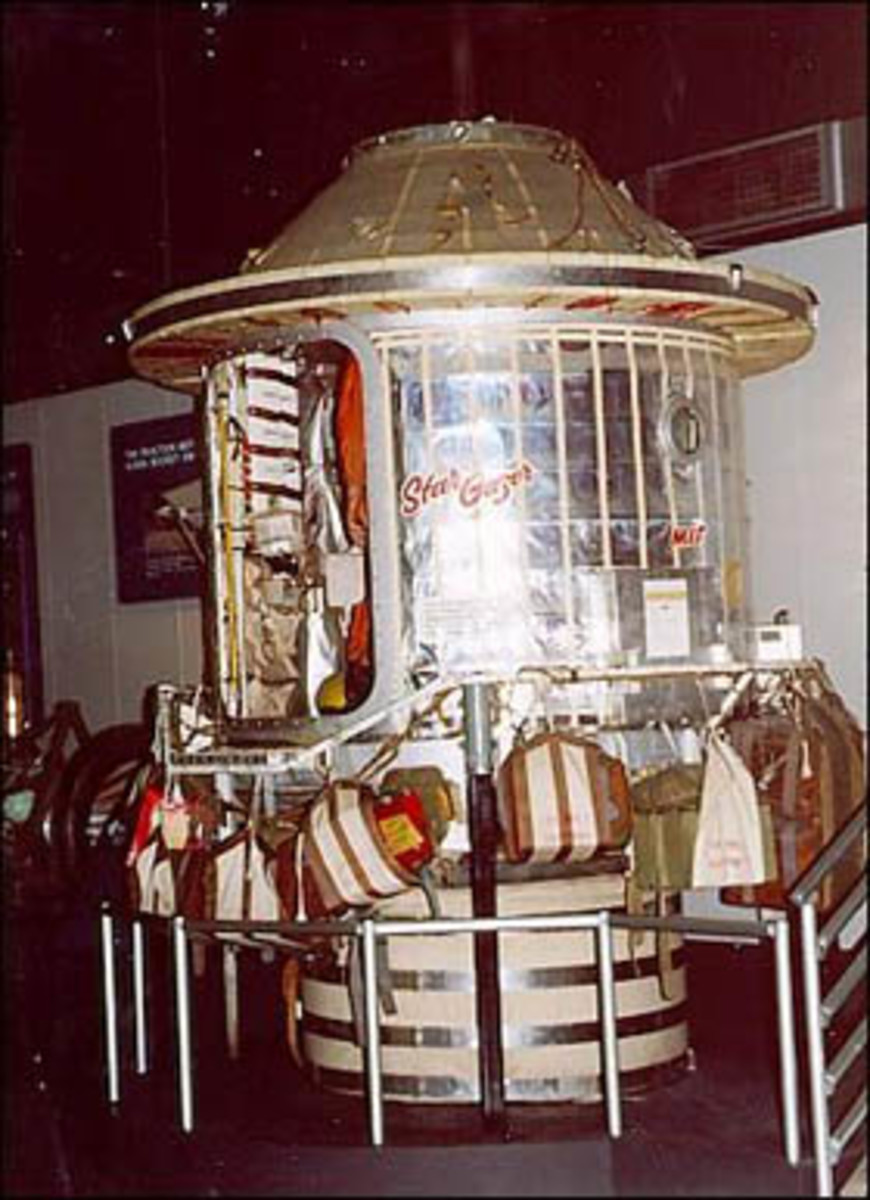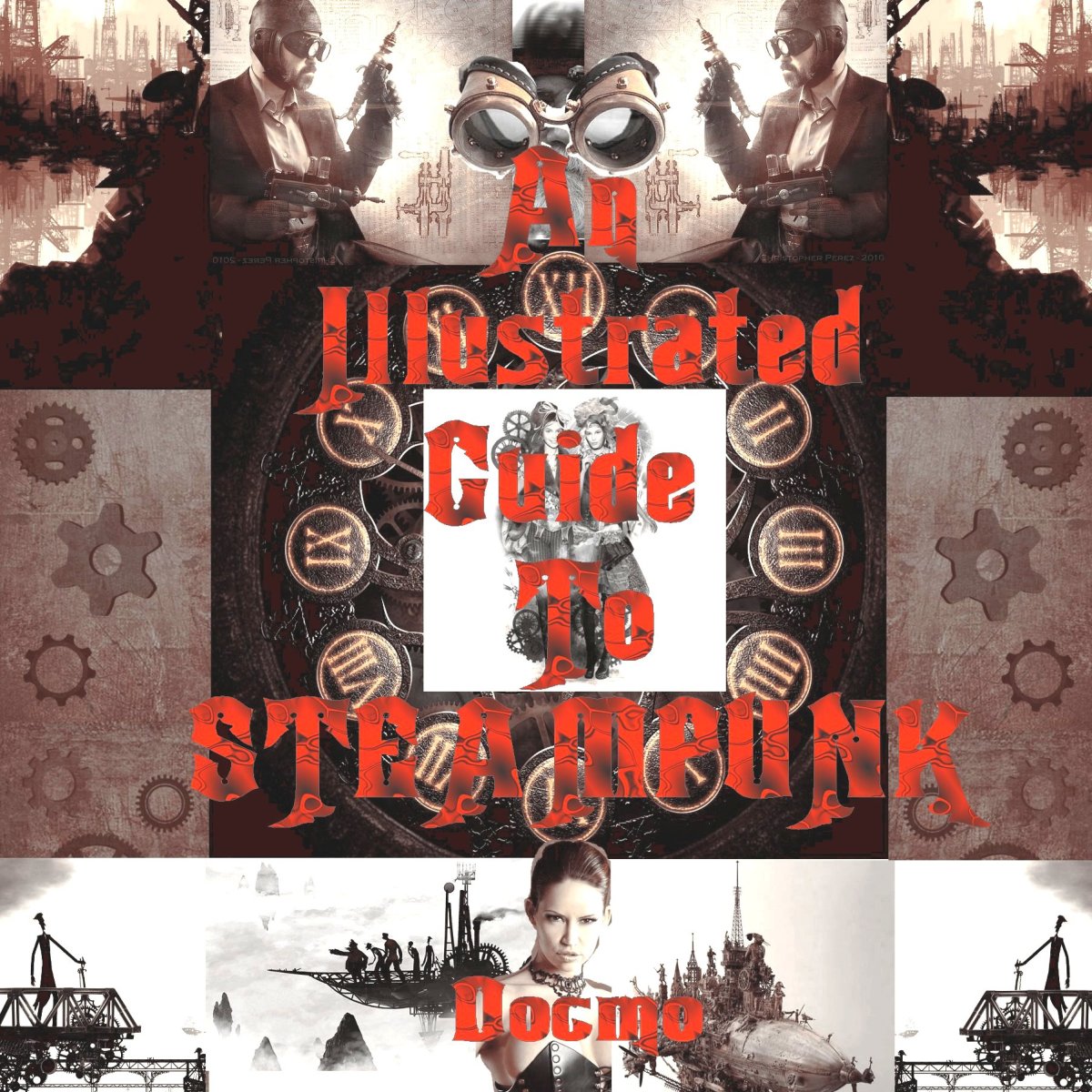The Space Merchants by Frederik Pohl & C.M. Kornbluth: A Book Review: Part One

Introduction
This is the first installment of reviews of four novels collected in a single volume: American Science Fiction (Four Classic Novels) 1953-1956, copyrighted in this form in 2012 by The Library of America.
Today I'd like to talk, just a little bit, about the science fiction novel The Space Merchants by Frederik Pohl and C.M. Kornbluth, originally published in 1953. I might also mention that this novel is a mere one-hundred-fifty-five pages. You see, there is a relationship between the year of publication and, by today's standards, the short length of the book.
Fiction writers were, overall, much more efficient and concise in the 1950s than they are today---in the United States, as far as I can tell, anyway. Now, there may have been a practical reason for this. We are talking about the 1950s here. It was the golden age of both the big and small screen; and network radio still had a lot of life left. Perhaps authors (genre authors in particular) saw their work as competing for attention with the mediums of television, the cinema, and radio.
Perhaps this inspired authors to make their literature as fast-paced, short (or concise), and "zippy,"---if I may use that word---as possible.
But perhaps this is not right. We also know that the 1950s was an era with an unprecedented amount of transfer from the printed page of literature (the genre writing in particular) to television and radio and, to some extent, movies. The science fiction writer, Ray Bradbury, for example, adapted sixty-five of his own short stories for television, a series called The Ray Bradbury Theater.
I remember the replay of a radio interview Bradbury did (on a WBAI science fiction/fantasy show called The Hour of the Wolf) in which he expressed the view that whenever one of his novels or stories was adapted for another medium, his preference was that they be adapted right from the page, the way he had more or less written it originally. Perhaps all of this is a reflection of the fact that we are talking about an era that was prior to the institutionalization of a standing corps of big and small screen specialist screenwriters.
And yet, having said all of that, I still believe that I have been treated to a complete novel, in the full sense of the word. I do not feel as though I have been deprived of anything in terms of sight, sound, smell, taste, texture, an eventful plot, character development, and the like. Perhaps we might ask why novels are so long today. If the publishing industry is sluggish, as we are always hearing, then perhaps what is needed is a revival of the inter-medium dynamism of the 1950s (today we would have to include the Internet as a terminal).
The Book
Now let us get on with the review. As is my custom, I am going to refrain from talking very much about the plot. That is for you, the reader of this essay, to discover should you decide to read the novel. I want to simply talk, very briefly, about a single element which I believe to be the controlling dynamic, the linchpin of the story. I'm talking about the power of shells. Let me explain.
When I first started reading the book, my first reaction was: This is almost like reverse-science fiction or regression-fiction, if you want to call it that. Its as if somebody took The Jetsons and The Flintstones and mushed them together! So, you would still have those bubbled-up "flying" cars of the Jetsons, but they don't actually fly under their own power anymore; instead they are born aloft by virtue of gigantic stilt legs reaching miles into the air.
In the world of The Space Merchants technology, in some ways, has regressed, gone backward, primitivized itself if you will; and yet we see that the population has been conditioned to publicly uphold this as forward progress. This is a world in which, in some ways, up is down and down is up.
Question: How can this be? Answer: This can be because the outer forms or shells of the previous technology are scrupulously maintained.
For example, in this world, the petrol-fueled (and 'hybrid') automobile now putters along strictly by pedal power. But again, this is not interpreted as a regression by the population. On the contrary, this development is publicly hailed as forward progress.
Here's a snatch of internal dialogue from the main character, Mitchell Courtenay, an advertising executive:
The Conservationists were fair game, those wild-eyed zealots who pretended modern civilization was in some way "plundering" our planet. Preposterous stuff. Science is always a step ahead of the failure of natural resources. After all, when real meat got scarce, we had soyaburgers ready. When oil ran low, technology had developed the pedicab.
Pedicab: the pedal-powered car.
At the beginning of the book, Courtenay's boss at the agency, one Fowler Schocken, gave a little pep talk to start the work day. He was talking about how well the firm has been doing.
Fowler Schocken: I don't think there's any person in this room who has less than a two-room apartment.
In this world, a two-room accommodation represents decent, dignified living suitable for the middle class.
I haven't tasted any protein but new meat for years...
In this world, "new meat" is a big deal. What this unwashed masses eat is a constantly regenerating something called "Chicken Little: You don't want to know!
... and when I go out for a spin I pedal a Cadillac.
A body or shell of a Cadillac maintains its relative prestige that it had during the time of oil, in a world where all cars are pedal-powered.
"Tree-grown" wood is spoken of as a mark of distinction. When you want the best, go with tree-grown!
Look at how the President of the United States is conceived in this world.
Mitchell Courtenay at the State Department
Quote: A morose little man in a bowler hat was waiting in the anteroom; when he heard my name he got up hastily and offered me his seat.
Keep your eye on the "morose little man."
Courtenay is asked to address the House of Representatives about something. Courtenay graciously agrees.
Thank you very much, Mr. Courtenay! He opened the door for me. The little man said tentatively:
Mr. Abels?
The legate shook his head. You can see how busy I am, he said, not unkindly. Come back tomorrow.
Keep your eye on the morose little man.
The little man smiled gratefully and followed me out the door. We both hailed a cab, and he opened the door for me. You know what cabs are like in Washington. Can I drop you anywhere, I asked.
It's very good of you, he said, and followed me in. The driver leaned back on his pedals and looked in at us.
Keep your eye on the "morose little man."
I told him: The Park Starr for me. But drop this other gentleman off first.
Sure. The driver nodded. White House, Mr. President?
We're also told that the office of the President of the United States is hereditary in this world. The national legislature is made up not of representatives from states of the union or districts within states. Instead, the representatives literally come from corporations---as in "The Chair recognizes the senator from General Electric." Like that.
There is a slight dissonance between the way the President and government is depicted here and the theme of glorious shells were discussing here. It is a minor quibble, almost not even worth mentioning. However I will return to it later.
Everything is not hollowed out though. The capacity for interplanetary travel is retained. You can take a rocket to the Moon and back. The public transportation system on Earth consists of a network of rockets (for trips too long for people to pedal, I guess). In fact, characteristic of science fiction of this period, the story is what I would call somewhat "rocket-happy" (1).
--------------------------------------------------------------------------------------------------------------
Venus
This brings us to the biggest shell of all: the project to colonize the planet Venus. Mitchell Courtenay is quite high up the totem pole at the advertising agency of Fowler Schocken Associates. The boss makes Courtenay the point man on the project to sell, sell, sell the public on the wondrous adventure in store in colonizing Venus.
Question: Why is the Venus project a shell?
Answer: quoting--- "A voice from the screen said triumphantly and inaccurately: 'This is the ship that spans the stars.' I recognized the voice as belonging to one of the organ-toned commentators in Aural Effects and expertized the scripts without effort as emanating from one of Tildy's girl copywriters. The talented slovenliness that would confuse Venus with a star had to come from somebody on Tildy's staff.
'This is the ship that a modern Columbus will drive through the void,' said the voice. 'Six and a half million tons of trapped lightning and steel---an ark for eighteen hundred men and women, and everything to make a new world for their home. Who will man it? What fortunate pioneers will tear an empire from the rich, fresh soil of another world? Let me introduce you to them---a man and his wife, two of the intrepid...'
Are you catching on to the hype from the advertisement? Good.
Still quoting
"The voice kept on going. On the screen the picture dissolved to a spacious suburban roomette in early morning. On the screen the husband folding the bed into the wall and taking down the partition to the children's nook; the wife dialing breakfast and erecting the table. Over the breakfast juices and the children's pablum (with a steaming mug of Coffiest for each, of course) they spoke persuasively to each other about how wise and brave they had been to apply for passage in the Venus rocket. And the closing question of their youngest babbler ('Mommy, when I grow up kin I take my littul boys and girls to a place as nice as Venus?') cued the switch to a highly imaginative series of shots of Venue as it would be when the child grew up---verdant valleys, crystal lakes, brilliant mountain vistas."
Just a little more...
"The commentary did not exactly deny, and neither did it dwell on, the decades of hydroponics and life in hermetically sealed cabins that the pioneers would have to endure while working on Venus' unbreathable atmosphere and waterless chemistry."
Okay? See why the Venus project is the biggest 'shell' of the story?
Good.
-----------------------------------------------------------------------------------------------------------------
Let's go back to the example of the pedicab: the pedal-powered automobile.
When I read that I thought to myself: Why do they hold on to this pretense? Why don't they just go to riding bicycles?
But then, upon reflection I said to myself: Well, the body of an automobile does provide a body with protection from the elements. I then concluded with: I guess even shells have their uses.
I asked myself if we could apply this concept of "shells" to other things in life.
Digression---human psychology
I heard a man on the radio say that there is a difference between the clinically depressed and the rest of us who do not suffer from this condition.
The man said that most of us (without clinical depression) have a somewhat exaggerated perception of our own intelligence and attractiveness. Interestingly, depressed individuals are what you might call hyper-realistic. That is to say, they do not have an inflated view of their own intelligence and attractiveness.
If I may oversimplify, the man basically said that those of us without depression tend to see opportunity everywhere; we are more optimistic. We tend to see the world through relatively "rose-colored glasses." The man said that depressed people tend to have a more realistic view of the way the world works and what life is all about.
I know what you're thinking. You think that I am suggesting some kind of reversal of who's "sane" and who's "crazy." I am not. Two plus two still equals four; and up is still up and down is still down. And, by the way, as you know, clinically depressed people are not "crazy."
Let me suggest to you that the slightly exaggerated internal view of ourselves as more intelligent and attractive than we are; and life as more of the "streets paved with gold" type than it realistically is---are our shell (those of us who are not depressed).
But---and this is extremely important---these shells are NOT necessarily instruments of self-deception. I think these shells of ours are instruments of aspiration. We know, as individuals, that we are "not all that," as they say. However, each of us (those of us who do not suffer from clinical depression) can imagine ourselves at a higher state. This gives us something to reach for. It is perhaps what gives life "meaning," if you will.
Again, let us go back to the pedicab example.
Does all of this mean that the society we're looking at in The Space Merchants, holds on to the "shell" of the automobile because it is aspirational---or, more accurately, re-aspirational because they are looking to recover something that had been lost? Is this, in fact, a healthy response of the society, holding on to hope in this way?
I am going to answer both questions in the affirmative, yes.
I'm going to wrap this up by saying that, in fact, redemption in this novel occurs when people find a way to make the inner guts of outwardly glittering structures more closely resemble the glorious shell. Basically, redemption happens (or is edged toward) when people begin to "walk the talk," and so forth.
One gets the feeling that the Venus project only becomes real when the rebels, the "Conservationists' (called "Consies" for short) take it over. It is interesting to note that the novel's hero, Mitchell Courtenay, really becomes the hero when he steers the machinery of Fowler Schocken Associates toward the ends of the Conservationists (the actual good guys of the book), while still hanging on to the shell of massive executive power and prestige of being the head of the world's most powerful advertising agency.
In other words, Mitchell Courtenay's "shell" remains the same but the guts are filled with something else, something of substance.
The Government
Let's go back to the way the President of the United States and the national government are depicted in this novel. Well, let's just focus on the President. As you observed from the passage we read together, political democracy doesn't have much of a shell in this world, what with the sitting Commander-in-Chief having to take a cab and all.
Does that mean that we are looking at a society, in The Space Merchants, who had turned so loathsome against democracy that it would not even brook a decent shell for it?
If that effect was deliberate, then job well done. But then again: Remember my saying that redemption occurs in the novel when the internal substance comes to resemble the external, glorious shell?
Well, that is true. Even the "morose little man" of a President does experience something of a redemption. Of course, I have to stress "something" of a redemption. That particular situation is not of special interest for our purposes.
Here is the point
The novel ends on a positive, very hopeful note. Mitchell Courtenay has reformed, become a more complete, harmonious person and all that good stuff. While keeping---for now---the shell of a soulless chief executive of the world's most powerful advertising agency, he resolves to steer its vast wealth and power toward the ends of the Conservationists (the word means what you think it means). Courtenay, I should say, has undergone a number of circumstances that has made him "see how the other half lives," and so forth.
Anyway, we see quite clearly that if their mission is to succeed, they will need the help of a regenerated "Presidency" (you see, the chief executive, while not quite a conservationist himself, is sympathetic with their goals). What I'm talking about is a regenerated representative political (not commercial) democracy. That is what will be needed if our heroes' mission is to succeed.
But first, the society will have to find the wherewithal to reconstitute a decent "shell" of democracy as perhaps a necessary first step.
Thank you for reading.
-----------------------------------------------------------------------------------------------------------------
Notes
1. What I mean by the rigged up term 'rocket happy' is just a way of characterizing how science fiction of the 1950s treats the prospects of what the future would bring in material terms. Elsewhere I cited specifically the science fiction of Ray Bradbury and Philip K. Dick as exhibiting a kind of euphoric, World's Fair type of exuberance about what the future will bring in technological and scientific terms. The future in their conception (and fifties science fiction in general, more or less)---to oversimplify---basically draw out a future like that of The Jetsons.
Go to part two. http://wingedcentaur.hubpages.com/hub/The-Long-Tomorrow-A-Book-Review








